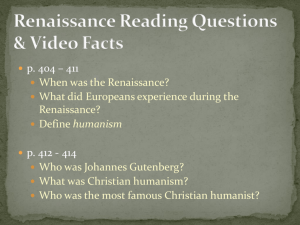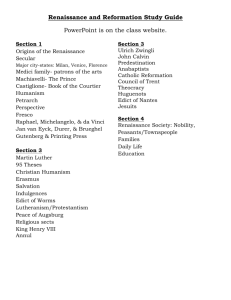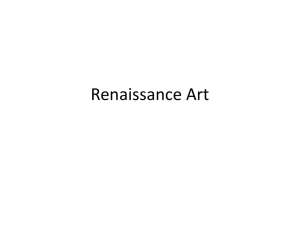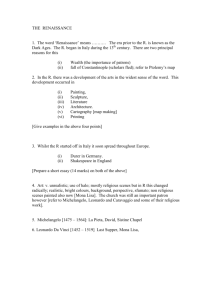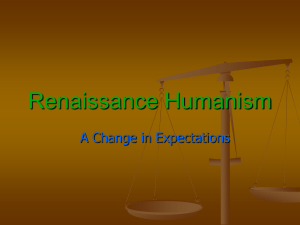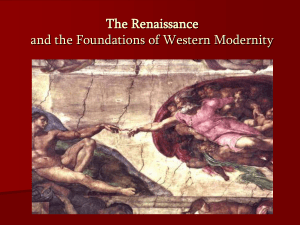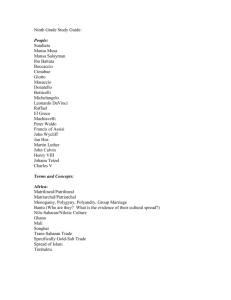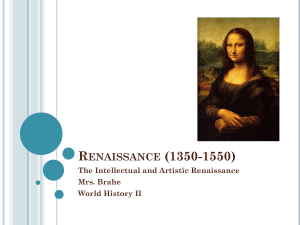File
advertisement
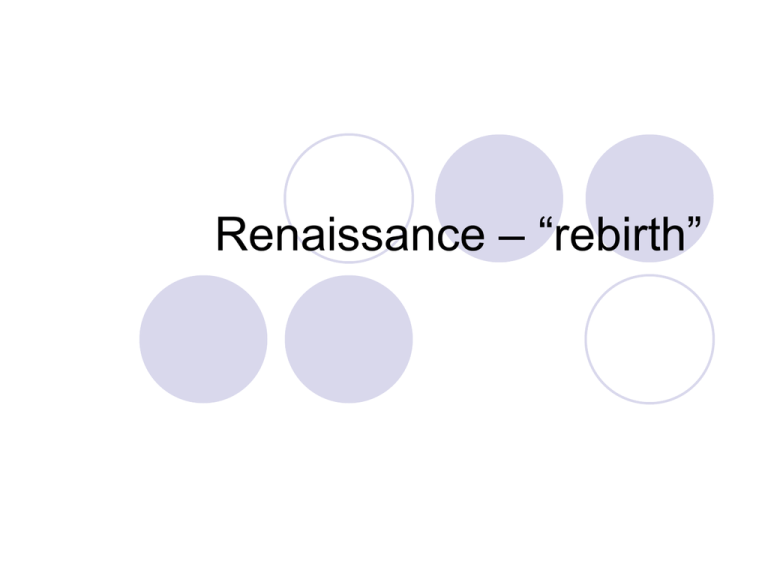
Renaissance – “rebirth” Location – spreads to Northern Europe Location – starts in Italy (the boot!) Renaissance “Rebirth” of classical culture People – Shakespeare, Erasmus, artists Da Vinci and Michelangelo Birth of modern world Map of Renaissance Italy What characteristics of Italian geography made the Renaissance possible? NOT anti-Church Secular Focus on humanity, self Individual Humanism Focus on education Self-Improvement Supported by wealthy patrons Medici family, Church Revival of Greek/Roman culture Classical Characteristics of the Italian Renaissance Humanism 1. focus on self – humanity, ideas of selfimprovement and free will to decide all actions, based on human reason 2. secular learning, NOT anti-Church, often accused of being anti-Church due to the shift in influence (Erasmus) 3. focus on education as an avenue for selfimprovement, education means one can move up in society 4. revival of Greco-Roman ideals – art (Leonardo and Michelangelo), architecture, philosophy, literature (Petrarch, Shakespeare) 5. supported by wealthy patrons (Medici) Characteristics of the Northern Renaissance – Christian Humanism Christian humanism –add Christian beliefs to humanist ideas of selfimprovement and education. Erasmus – Netherlands 1. The Praise of Folly – brought to light issues in the Catholic Church, poked fun 2. #1 Humanist Shakespeare – England 1. #1 Poet, Playwright in world history (might get some arguments, but from a historical sense, he is focused on the most) 2. Focuses on the humanity of the human condition – faults are often fatal 3. Ex. Romeo and Juliet, Hamlet, Macbeth – takes historical subjects, modernizes it for current people Michelangelo – Sistine Chapel Michelangelo, 1508-1512 The Creation of Adam How does the Creation of Adam reflect Humanism? Michelangelo – David How does the David reflect humanism? Leonardo da Vinci – Vitruvian Man “uomo universalis” How does the Vitruvian Man reflect humanism? Leonardo selfportrait Leonardo da Vinci – The Last Supper The Last Supper How does this image of Jesus reflect humanism? Leonardo – La Gioconda (Mona Lisa) Mona Lisa – details Effects of the Printing Press Effects of the Printing Press Developed by Johannes Gutenberg, Germany after original development by Chinese Increased literacy Spread ideas faster Printing of Bible in Vernacular English, German These Five Things 1. The Renaissance was a “rebirth” of classical Greek and Roman culture, and the “birth” of the modern world – that spread from Italy to Northern Europe. 2. Michelangelo painted the ceiling of the Sistine Chapel and sculpted the David; Leonardo painted The Last Supper and the Mona Lisa. 3. Erasmus was a Northern Renaissance humanist who focused on combining the Catholic Church and secular culture in his The Praise of Folly. 4. The development of the Gutenberg printing press led to the growth of literacy throughout Europe, the printing of the Bible in the vernacular English, French, and German, and the spread of ideas in the Renaissance and Reformation. 5. Overall, the Renaissance increased secular culture, individualism (humanism), and religious tolerance. Exit Ticket and Homework 1. What is the Renaissance? 2. Is the Renaissance a continuation of the medieval period or the birth of the modern world (pick 1 only!)? Why do you feel this way? 3. What is humanism? 4. Who is the ideal humanist, and why? 5. What people today would be considered humanists?

